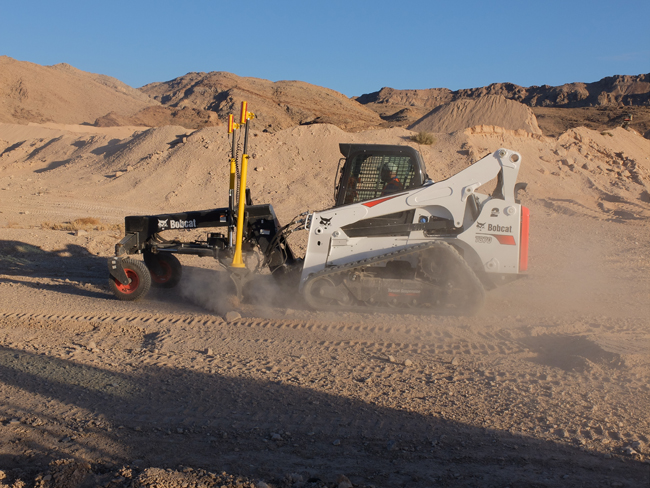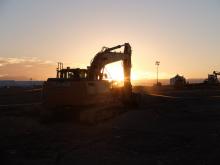
Scott Crozier is general manager of Trimble’s general construction division. He said that while this autonomous machine technology is not yet ready for the market, “It may not be as far away as expected.”
Trimble still has a lot of development work to carry out on its autonomous machine control package and there will be other challenges too. He said, “There will be some regulations we’ll have to comply with.”
However the firm is confident that the project will deliver practical solutions and Crozier continued, “It’ll come in gradually.” He added that certain elements of the technology will be brought to market in the near future. Semi-autonomous technology could be on the market by 2020, with autonomous machines then being introduced for certain applications within five years.
The technology is being aimed at a particular range of duties. Crozier explained that these systems could be used in large greenfield construction sites such as for new airports or for use at landfill sites, where equipment would typically carry out repetitive operations. Geofencing would ensure that the machines would run in controlled areas away from personnel, optimising safety.
Trimble’s Site Vision package has been offered on limited release to a number of firms in EEP (early engagement program) format, to help develop the system. Crozier explained that Trimble is working with a number of selected customers at the leading edge of construction technology, so as to help refine the system for release in due course. These firms are encouraged to use the Site Vision package in parallel with existing systems.
Development is ongoing and Crozier said, “Our goal is to have a production-ready version next year.”
A user can see a visualisation of the project using a smartphone or another handheld device. This can show the design of a project as well as the as-built phase during construction and the completed work afterwards. Crozier said, “It ties in cut and fill data from the machine into the back office.”
Another highly advanced prototype system Trimble is working on is based on the Earthworks package and is intended to reduce the risk of contractors hitting buried utilities when carrying out digging operations. A mixed reality solution, this emerging technology will be available in the near future according to Crozier. The package is integrated into the machine display and provides a visual reference for the operator where buried utilities lie. An object avoidance system that physically limits the machine from digging further to prevent hitting a utility line is slightly further away however.
Moving back down to earth somewhat, the firm is also introducing the Earthworks GO! package, aimed at use with compact machines. This is a significant development as it will allow users of small machines access to machine control systems, improving productivity and work quality.
The firm says that its Earthworks GO! offering allows users to deliver accurate grading with a simple, portable package. This compact machine control solution runs on Android or iOS smartphones. Crozier commented, “It’s a very simple system.”
This package can be used with skid steer loaders or compact loaders from
The package can be used by contractors involved in general construction, site preparation and utility work for grading flat and simple slopes. The system utilises laser technology to provide dynamic, real-time position information and allows an operator to grade or cut profiles quickly and accurately.
The firm says that the system requires little training time and can increase an operator’s productivity up to 20%. It has software that guides the user through installation, setup and operating modes. The package was specifically designed for local small site contractors and owner-operators and is said to be the easiest system on the market to install. Trimble’s system allows full-sensing technology with no mounting hardware needed. Contractors can save machine profiles to the system to ensure the grading attachment only needs to be set up once. This makes it quick and easy to move the system between machines.
The package can be ready to use in minutes and Crozier explained, “It’s aimed at the smaller contractor and is a 2D system as not everybody needs 3D. It’s mostly for use with dozer blades on Cat or Bobcat machines but it will support a grader blade too.”
The emphasis is on using available technology and Crozier said, “It all runs on your phone and there’s no display needed.”
This system is the first in a portfolio of products for compact machines, with others planned to be introduced in phases.





